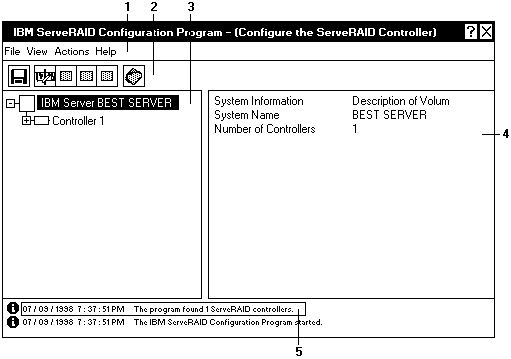ServeRAID Configuration Program
ServeRAID Configuration Program
The graphical interface in the ServeRAID Configuration
Program makes it easy for you to create, delete, change,
or view your ServeRAID configuration. Before you begin,
review the following illustration to become familiar with the
layout of the configuration program screens.

Descriptions of the numbered areas are as follows:
- Menu Bar Provides standard File, View, Actions, and
Help pull-down menus. See 'Menu Bar' for more information.
- Tool Bar Provides quick-path icons for common tasks.
The icons from left to right are Save the
Configuration Event Log, Configure the
ServeRAID Controller, Configure for
Clustering, Scan for New or Removed Ready
Drives, Create an Array, and Help. See 'Tool Bar' for more information.
Provides an expandable tree view of your
ServeRAID subsystem. You will perform
most of your ServeRAID configuration and
maintenance tasks by first selecting the
ServeRAID controller, array, logical drive,
hot-spare drive, or physical drive objects from this Main Tree.
- Main Panel Provides specific device information or
configuration instructions. When the
configuration program is in the Information
mode and you select an object from the Main
Tree, detailed information about the object
appears in this panel. When the
configuration program is in the Configuration
mode, the instructions needed to configure
your ServeRAID subsystem appear in this panel.
- Event Viewer Provides advisory and progressive-status
information and messages during the
ServeRAID configuration process. Each
message appears with a time stamp, a date
stamp, and an icon that classifies the severity
of the event. Attention messages identify
potential data-loss situations, and Fatal
messages inform you when a failure has occurred.
Back to 
Please see the LEGAL - Trademark notice.
Feel free - send a  for any BUG on this page found - Thank you.
for any BUG on this page found - Thank you.


 for any BUG on this page found - Thank you.
for any BUG on this page found - Thank you.